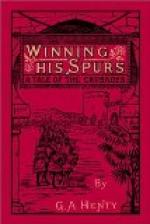“Why,” Cuthbert exclaimed, “I passed through that village, and it is but three miles from the holy city.”
“That is so,” the earl said; “and many of us, ascending the hill in front, saw Jerusalem. But even then it was certain that we must again retrace our steps; and when we asked King Richard to come to the crest of the hill to see the holy city, he refused to do so, saying, ’No; those who are not worthy of conquering Jerusalem should not look at it!’ This was but a short time since, and we are now retracing our steps to Acre, and are treating with Saladin for a peace.”
“Then,” Cuthbert said sadly, “all our hopes and efforts are thrown away; all this blood has been shed for nothing; and after the three great powers of Europe have engaged themselves solemnly in the war, we are baffled, and have to fall back before the hordes of the infidels.”
“Partly before them,” the earl said, “partly as the result of our own jealousies and passions. Had King Richard been a lesser man than he is, we might have conquered Jerusalem. But he is so extraordinary a warrior that his glory throws all others into the shade. He is a good general, perhaps the best in Europe; and had he done nothing but lead, assuredly we should have carried out our purpose. See how ably he maneuvered the army at the fight of Azotus. Never was a more complete defeat than that which he inflicted there upon the Saracens; and although the fact that his generalship achieved this, might have caused some jealousy to the other commanders, this might have died away could he between the battles have been a general, and nothing more. But alas! he is in addition a knight-errant—and such a knight-errant as Europe has never seen before. Wherever there is danger, Richard will plunge into the midst. There are brave men in all the three armies; but the strongest and bravest are as children to King Richard. Alone he can dart into ranks of the infidels, and cut a lane for himself by the strength of his right arm. More than this, when danger has threatened he has snatched up his battle-axe and dashed into the fray without helm or cuirass, performing such prodigies of valour and strength that it has been to his prowess alone that victory was to be ascribed. Hence he is the idol of all the soldiers, whatever their nationality; for he is as ready to rush to the rescue of a French or Austrian knight when pressed as to that of his own men. But the devotion which the whole army felt for him was as gall and wormwood to the haughty Austrian and the indolent Frenchman; and the retirement of the King of France, which left Richard in supreme command, was in every way unfortunate.”




